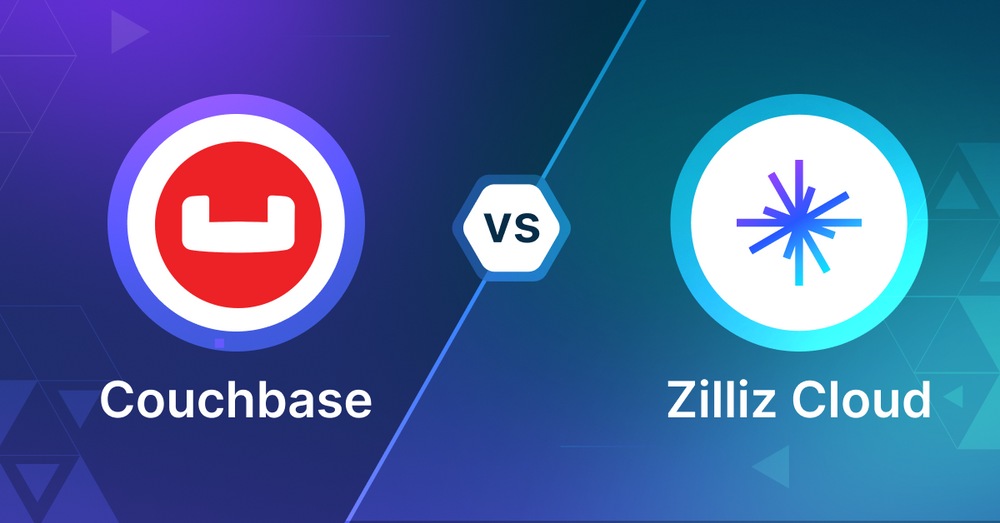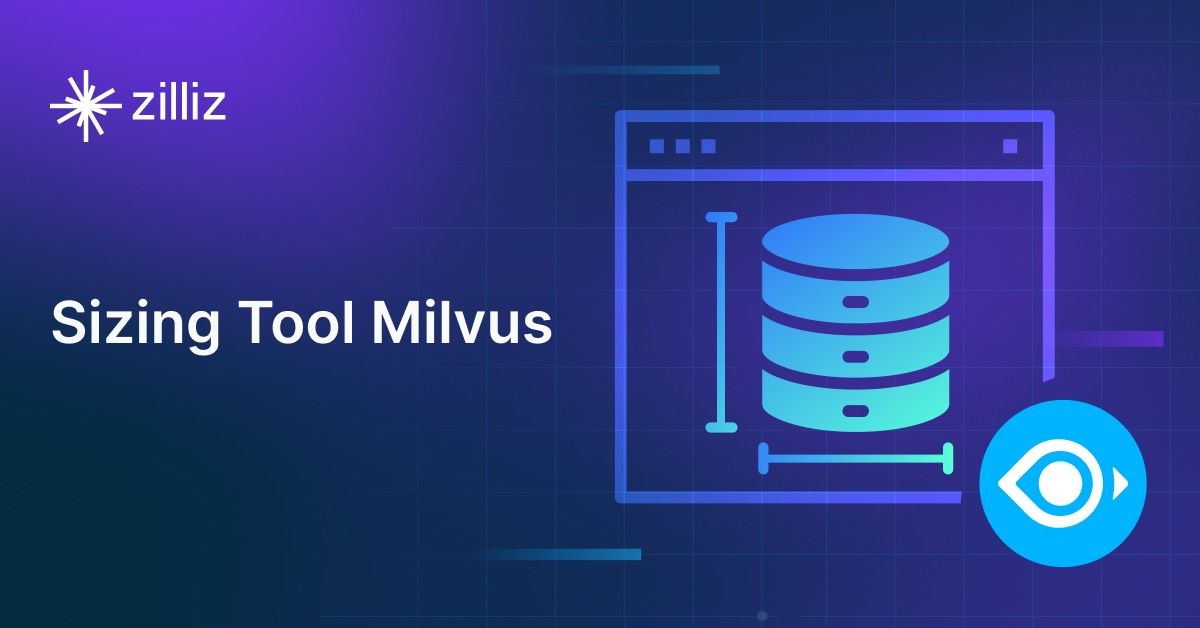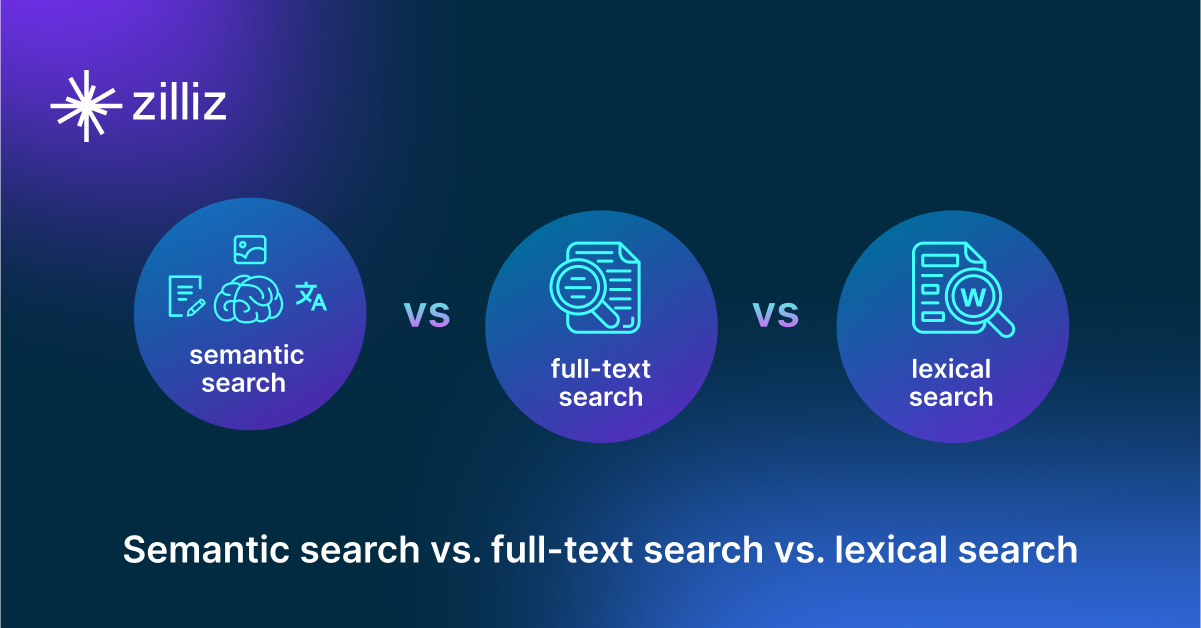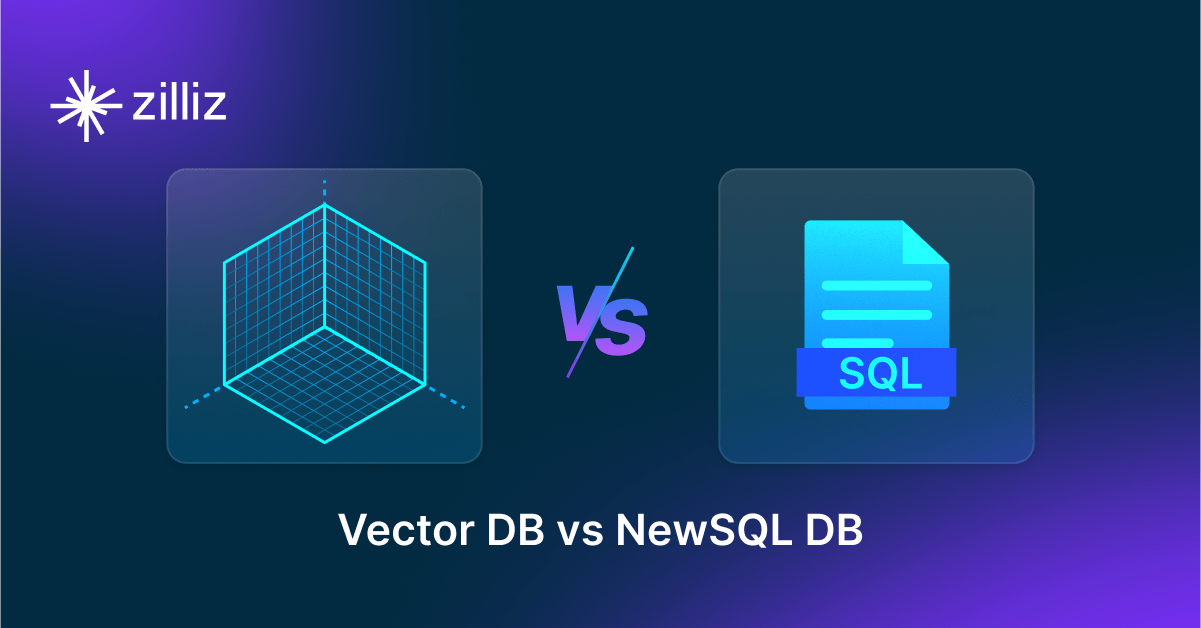Couchbase vs Zilliz Cloud Choosing the Right Vector Database for Your AI Apps

What is a Vector Database?
Before we compare Couchbase and Zilliz Cloud, let's first explore the concept of vector databases.
A vector database is specifically designed to store and query high-dimensional vectors, which are numerical representations of unstructured data. These vectors encode complex information, such as the semantic meaning of text, the visual features of images, or product attributes. By enabling efficient similarity searches, vector databases play a pivotal role in AI applications, allowing for more advanced data analysis and retrieval.
Common use cases for vector databases include e-commerce product recommendations, content discovery platforms, anomaly detection in cybersecurity, medical image analysis, and natural language processing (NLP) tasks. They also play a crucial role in Retrieval Augmented Generation (RAG), a technique that enhances the performance of large language models (LLMs) by providing external knowledge to reduce issues like AI hallucinations.
There are many types of vector databases available in the market, including:
- Purpose-built vector databases such as Milvus, Zilliz Cloud (fully managed Milvus)
- Vector search libraries such as Faiss and Annoy.
- Lightweight vector databases such as Chroma and Milvus Lite.
- Traditional databases with vector search add-ons capable of performing small-scale vector searches.
Couchbase is a distributed multi-model NoSQL document-oriented database with vector search capabilities added on. Zilliz Cloud is a purpose-built vector database. This post compares their vector search capabilities.
Couchbase: Overview and Core Technology
Couchbase is a distributed, open-source, NoSQL database that can be used to build applications for cloud, mobile, AI, and edge computing. It combines the strengths of relational databases with the versatility of JSON. Couchbase also provides the flexibility to implement vector search despite not having native support for vector indexes. Developers can store vector embeddings—numerical representations generated by machine learning models—within Couchbase documents as part of their JSON structure. These vectors can be used in similarity search use cases, such as recommendation systems or retrieval-augmented generation both based on semantic search, where finding data points close to each other in a high-dimensional space is important.
One approach to enabling vector search in Couchbase is by leveraging Full Text Search (FTS). While FTS is typically designed for text-based search, it can be adapted to handle vector searches by converting vector data into searchable fields. For instance, vectors can be tokenized into text-like data, allowing FTS to index and search based on those tokens. This can facilitate approximate vector search, providing a way to query documents with vectors that are close in similarity.
Alternatively, developers can store the raw vector embeddings in Couchbase and perform the vector similarity calculations at the application level. This involves retrieving documents and computing metrics such as cosine similarity or Euclidean distance between vectors to identify the closest matches. This method allows Couchbase to serve as a storage solution for vectors while the application handles the mathematical comparison logic.
For more advanced use cases, some developers integrate Couchbase with specialized libraries or algorithms (like FAISS or HNSW) that enable efficient vector search. These integrations allow Couchbase to manage the document store while the external libraries perform the actual vector comparisons. In this way, Couchbase can still be part of a solution that supports vector search.
By using these approaches, Couchbase can be adapted to handle vector search functionality, making it a flexible option for various AI and machine learning tasks that rely on similarity searches.
Zilliz Cloud: Overview and Core Technology
Zilliz Cloud is a fully managed vector database service built on top of the open-source Milvus engine. It helps developers and organizations to handle large scale AI applications by storing, managing and searching vector embeddings efficiently. It takes care of infrastructure for you, so you can focus on building AI features instead of managing databases.
One of the key advantages of Zilliz Cloud is the automatic performance optimization. The system has AutoIndex technology which will choose the best indexing method for your data and use case. So you don’t have to spend time tuning parameters or comparing different index types. The platform also uses IVF (Inverted File) and graph-based techniques to speed up similarity search across large datasets.
The platform has enterprise features. You can deploy your vector databases across AWS, Azure or Google Cloud, with options to use Zilliz’s fully managed service or bring your own cloud account (BYOC). For organizations that handle sensitive data, Zilliz Cloud has security controls like encryption, access management and compliance tools. The system also supports different consistency levels so you can balance between fast updates and strong data consistency based on your needs.
Cost management is another important aspect of Zilliz Cloud. The platform uses tiered storage to automatically move less accessed data to cheaper storage options, so you can reduce cost without affecting performance. You can also choose compute resources that match your workload - for example, use more powerful instances for heavy processing tasks and lighter ones for simple queries. This flexibility helps you to optimize your spending while maintaining good performance.
For AI applications that need to search different types of data together, Zilliz Cloud supports hybrid search. You can search across text embeddings, image vectors and other data types in a single query. The platform also supports various similarity metrics like Cosine, Euclidean and Inner Product so it’s suitable for different machine learning models and use cases. As your data grows, the system can scale horizontally by adding more resources automatically so you can maintain good performance even under heavy workload.
Key Differences
Search Methodology
Couchbase: Couchbase doesn’t support vector search natively but has workarounds. You can store vector embeddings in JSON documents and use Full Text Search (FTS) for approximate vector search by tokenizing vectors. Or you can integrate with external libraries like FAISS or do similarity calculation at application level. These methods are flexible but require more implementation effort.
Zilliz Cloud: Built for vector search, Zilliz Cloud uses optimized indexing methods like IVF and graph-based techniques for high performance similarity search. AutoIndex eliminates the need for manual tuning, so developers can just focus on coding.
Data
Couchbase: Handles structured, semi-structured and unstructured data through its JSON document model. While flexible, it’s not optimized for high-dimensional vector data and requires customization.
Zilliz Cloud: For unstructured and vectorized data. Supports hybrid search, allows queries across text embeddings, image vectors and other data types, perfect for AI-driven applications.
Scalability and Performance
Couchbase: Horizontal scalability and high throughput for document-based operations. But performance for vector search depends on the chosen integration or application-layer computation which may not scale well for very large datasets.
Zilliz Cloud: Scales with large AI workloads, uses distributed architecture to maintain performance as data grows. Tiered storage optimizes cost-performance for less frequently accessed data.
Flexibility and Customization
Couchbase: Highly customizable for general purpose applications. Developers have full control over vector search implementation from storage to similarity calculation.
Zilliz Cloud: Flexibility in similarity metrics (e.g. Cosine, Euclidean, Inner Product) and multiple deployment options (fully managed services and BYOC) but customization is more focused on vector use cases.
Integration and Ecosystem
Couchbase: Integrates with existing enterprise ecosystem, has SDKs for multiple programming languages and compatible with external search libraries for vector specific needs.
Zilliz Cloud: Natively integrates with AI/ML workflows, compatible with Milvus and tools like DsPy and LangChain. Simplifies vector-based application development through its APIs.
Ease of Use
Couchbase: Developers need to configure and implement vector search themselves, which can be complex and time-consuming. Extensive documentation and community support is available but the learning curve is steep for advanced use cases.
Zilliz Cloud: Easy to use, auto-optimization and minimal setup. Abstracts infrastructure management so developers can focus on AI/ML tasks without worrying about database maintenance.
Cost
Couchbase: Cost varies depending on deployment and computational overhead of vector search. Operational cost may increase if external tools are used for vector indexing or similarity calculation.
Zilliz Cloud: Predictable pricing with managed services. Tiered storage and customizable compute resources helps to optimize cost especially for large scale workloads.
Security
Couchbase: Has robust security options, encryption, role-based access control and integration with enterprise authentication systems. But securing additional vector search integrations requires custom implementation.
Zilliz Cloud: Enterprise grade security with encryption, access management and compliance features. Managed services has built-in security controls so developers don’t have to.
When to Choose Couchbase
Couchbase is a good choice when you need a database that’s flexible, distributed and can handle structured, semi-structured and unstructured data in large scale applications. Its JSON document model and scalability make it suitable for content management, mobile apps and IoT workloads. For vector search, Couchbase can do basic or approximate similarity queries through Full Text Search or custom integrations, which is good if vector search is a secondary feature in a larger application. Developers who need high control and flexibility over database configurations, integrations and search algorithms will benefit most from Couchbase’s pluggable architecture.
When to Choose Zilliz Cloud
Zilliz Cloud is good for AI-driven applications that need efficient large scale vector search. Its purpose-built vector database handles high-dimensional embeddings natively, for use cases like recommendation systems, computer vision and retrieval-augmented generation. With features like AutoIndex for automatic performance optimization, hybrid search across multiple data types and managed services, Zilliz Cloud eliminates the need for manual configuration and infrastructure management. This is good for developers who want seamless vector search, need to handle diverse embedding data and want a system optimized for AI/ML workflows without having to implement custom solutions.
Conclusion
Couchbase and Zilliz Cloud are both good for different things. Couchbase is a flexible general purpose database with workarounds for vector search, good for complex multi-functional systems where vector search is not the main focus. Zilliz Cloud is specialized in vector search and AI/ML workloads, optimized for embedding-centric applications. The choice ultimately depends on your use case, the data you manage and how important vector search is in your application. Think carefully about these factors to choose the right technology for you.
Read this to get an overview of Couchbase and Zilliz Cloud but to evaluate these you need to evaluate based on your use case. One tool that can help with that is VectorDBBench, an open-source benchmarking tool for vector database comparison. In the end, thorough benchmarking with your own datasets and query patterns will be key to making a decision between these two powerful but different approaches to vector search in distributed database systems.
Using Open-source VectorDBBench to Evaluate and Compare Vector Databases on Your Own
VectorDBBench is an open-source benchmarking tool for users who need high-performance data storage and retrieval systems, especially vector databases. This tool allows users to test and compare different vector database systems like Milvus and Zilliz Cloud (the managed Milvus) using their own datasets and find the one that fits their use cases. With VectorDBBench, users can make decisions based on actual vector database performance rather than marketing claims or hearsay.
VectorDBBench is written in Python and licensed under the MIT open-source license, meaning anyone can freely use, modify, and distribute it. The tool is actively maintained by a community of developers committed to improving its features and performance.
Download VectorDBBench from its GitHub repository to reproduce our benchmark results or obtain performance results on your own datasets.
Take a quick look at the performance of mainstream vector databases on the VectorDBBench Leaderboard.
Read the following blogs to learn more about vector database evaluation.
Further Resources about VectorDB, GenAI, and ML
- What is a Vector Database?
- Couchbase: Overview and Core Technology
- Zilliz Cloud: Overview and Core Technology
- Key Differences
- Using Open-source VectorDBBench to Evaluate and Compare Vector Databases on Your Own
- Further Resources about VectorDB, GenAI, and ML
Content
Start Free, Scale Easily
Try the fully-managed vector database built for your GenAI applications.
Try Zilliz Cloud for FreeKeep Reading

Demystifying the Milvus Sizing Tool
Explore how to use the Sizing Tool to select the optimal configuration for your Milvus deployment.

Semantic Search vs. Lexical Search vs. Full-text Search
Lexical search offers exact term matching; full-text search allows for fuzzy matching; semantic search understands context and intent.

Vector Databases vs. NewSQL Databases
Use a vector database for AI-powered similarity search; use a NewSQL database for scalable transactional workloads requiring strong consistency and relational capabilities.
The Definitive Guide to Choosing a Vector Database
Overwhelmed by all the options? Learn key features to look for & how to evaluate with your own data. Choose with confidence.